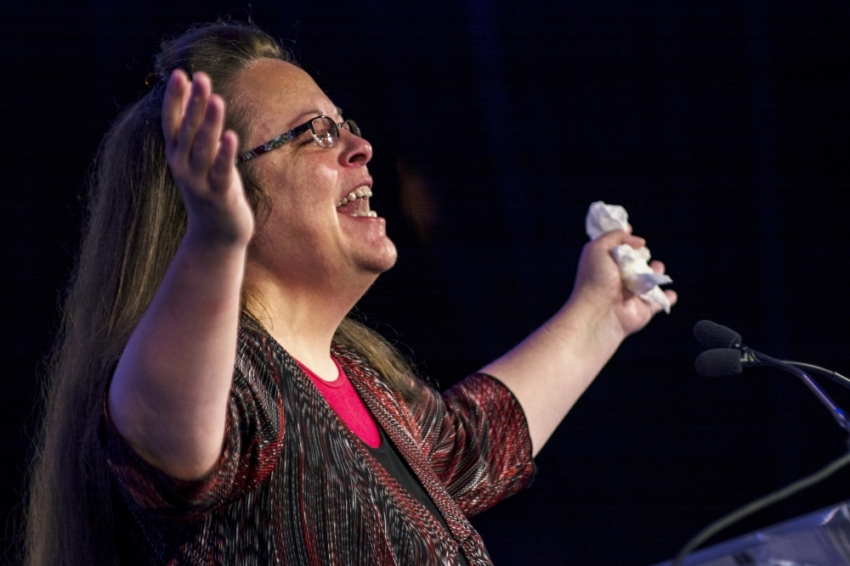Kim Davis Should Render to Caesar What Is Caesar's

Kentucky county clerk Kim Davis would do more for the Gospel by stepping down rather than continuing her legal fight to deny marriage licenses to same-sex couples.

As a New York-based, media-centric individual who has been ensconced in this faith world for over forty years, I understand the Evangelical mind-set all too well that drove Davis to her decision.
Ms. Davis is the latest lightning rod in the increasingly divided cultural arena between people of faith and the rest of the world that does not share that faith. She felt that she could not grant a marriage license to a gay couple because, she says, she cannot acquiesce to a government decree that does not square with her Christian faith. The only problem is that she is the county clerk who provides that service.
I find it helpful to refer back to the Bible (from which most faith followers derive their marching orders) to read what Jesus and others did in cases of conscience and baby splitting when confronted with similar issues. In the Kim Davis situation, I think we have to look deeper into what Jesus, the architect of civil disobedience, and others, actually taught. Understanding this is at the heart of the Davis case for Christians.
In Matthew 22, the political correctness police of Jesus' day wanted to entrap him with their "gotchas" that would land him in hot water. In this case, it was about paying taxes. Or so they thought. He came up with a great answer that we all know well — render to Caesar that things which are Caesar's, and to God, the things that are His.
The core issue was not about paying taxes, which was as incendiary an issue to the practicing Jewish faithful of that day as the polarization over same sex marriage is today to Kim Davis and others.
No, Jesus used that story to illustrate a greater principle and line of reasoning that was acted out in Acts 4 by Peter and John during their tête-à-tête with the Sanhedrin after the resurrection. They were flat out told to not proclaim Jesus any longer. To which Peter responded that they would need to follow God, and not man.
Simply, the line in the sand over which Caesar has no purview seems to be when Caesar tries to thwart or stop our efforts to proclaim Jesus and His message of the cross. Ultimately, our stand should be about who we believe, not what we believe.
When Daniel, like Kim Davis, also working in Caesar's court, failed to acknowledge King Darius as God, he was thrown into the lion's den. Again, Daniel stood for who he believed in, not whether decrees from Darius were consistent with his biblical worldview.
When government decrees, whether paying taxes or issuing same sex marriage licenses, become the "hill we die on" rather than the person of Jesus and the ability to proclaim Him, more and more polarization occurs. The problem with trying to defend God and our positions is that we get defensive. And then the other side feels they must also go into their defensive spirit, as well. Defensiveness only fuels the culture war.
Jesus always rose above the politics and polemics of the world that we often fall prey to in trying to defend issues related to faith rather than the central figure of that faith.
Jesus said that blessed would be those who are persecuted as a result of proclaiming Him. The operative statement here is proclaiming Him. Not proclaiming our dissatisfaction with a government decree. Or a law with which we disagree.
Jesus knew that people would stand up against all types of stuff by invoking His name and thereby rationalizing and validating their actions. The issue gets lifted up rather than Him, and He gets lost in the shuffle.
Jesus knew how futile it was to war against people and issues on His behalf. He did not ask us to, and He does not want us to. It just creates confrontation, as it has in the Kim Davis case. And then everyone loses sight of the Gospel, which is what Jesus asked His followers to focus on. Her cause may appear noble, but does it reflect how Jesus or Peter said we should act?
When working for Caesar, as Ms. Davis does, she is obligated to render unto Caesar.
Now, to be very clear, I am not saying that people of faith should not be involved in political action to right wrongs, change laws or express disagreement with what's happening in society. We should be. And strongly at times.
As a citizen, and as believer, though, Ms. Davis could have made an even stronger case by stepping down from her role as clerk and then, as a private citizen, expressing her disagreement. Or express her disagreement while still rendering to Caesar. In this case, issuing the marriage license while stating her personal disagreement.
God does not need a defense attorney. Ms. Davis may feel like she's standing up for her faith by obstructing what she has sworn to uphold, but is it really?
I might add that there may be other reasons for her actions, and ours, when we act in a similar fashion to battle issues we find objectionable. I believe that there is a tendency for many in our faith world to feel that "standing up for God" to fight the culture war is one way of making up for for ways in which they may have displeased God in other areas. To get God to "like" them once again, doing Him a favor might help.
This is really a distortion of the grace message where Jesus asks us to accept what civil government throws at us, or even offends us with, since there's a higher goal at stake.
Many people of faith refer to a verse in the Apostle Peter's first Epistle that tells us to always have a "defense for our faith" (I Peter 3:15). More accurately, he wasn't talking about "defending" our faith but about knowing how to explain our faith. It's absurd to think that God needs defending, but it makes some believers feel that they can find more favor with God that way.
Our role is not to change culture but to pronounce the Gospel and let it change culture. When we try to change culture, it gets confrontational. When the Gospel changes culture, it's transformational.
Jesus wants us to use grace against law. It may not make sense, but it accomplishes more ultimately for the Kingdom of God than fostering the polarization that we see rampant in our country today.



























